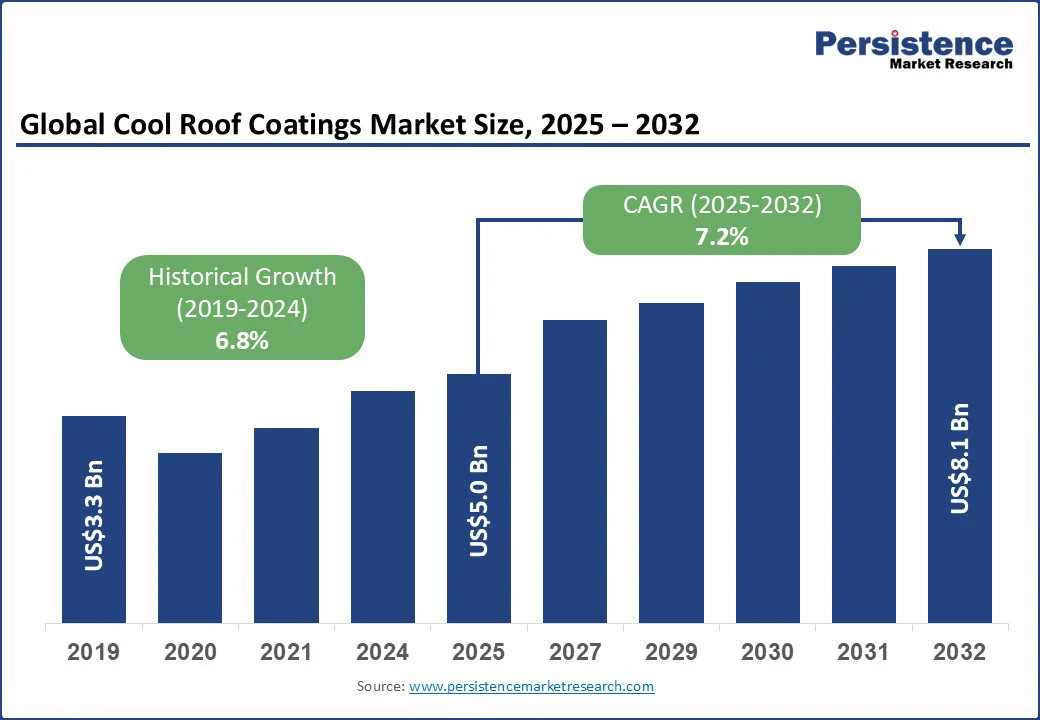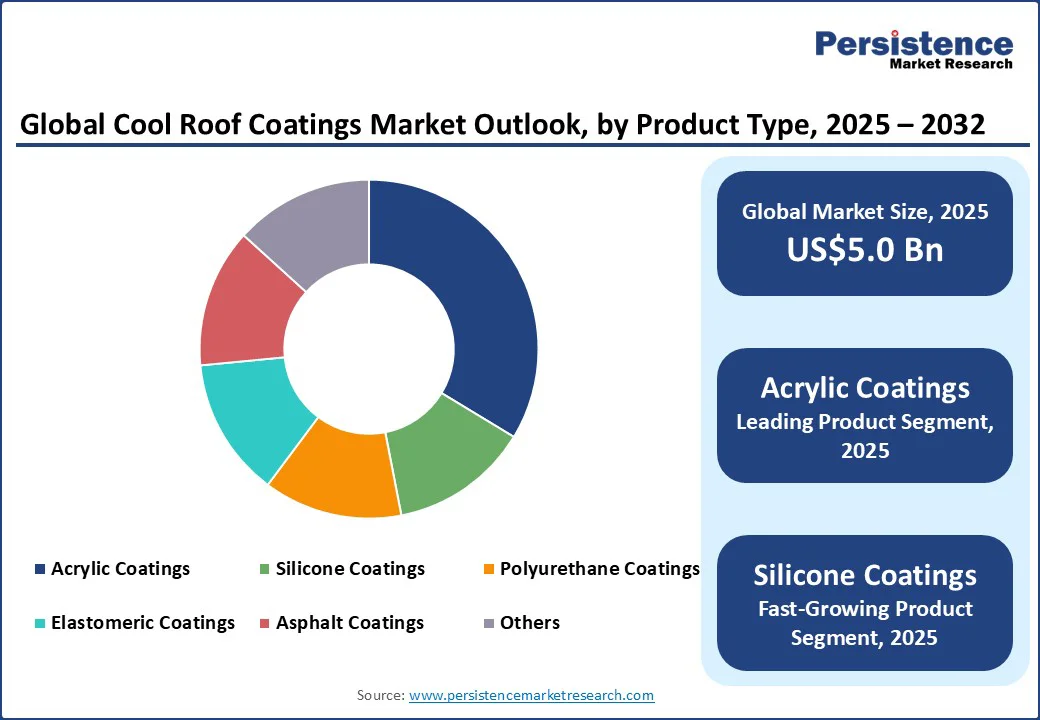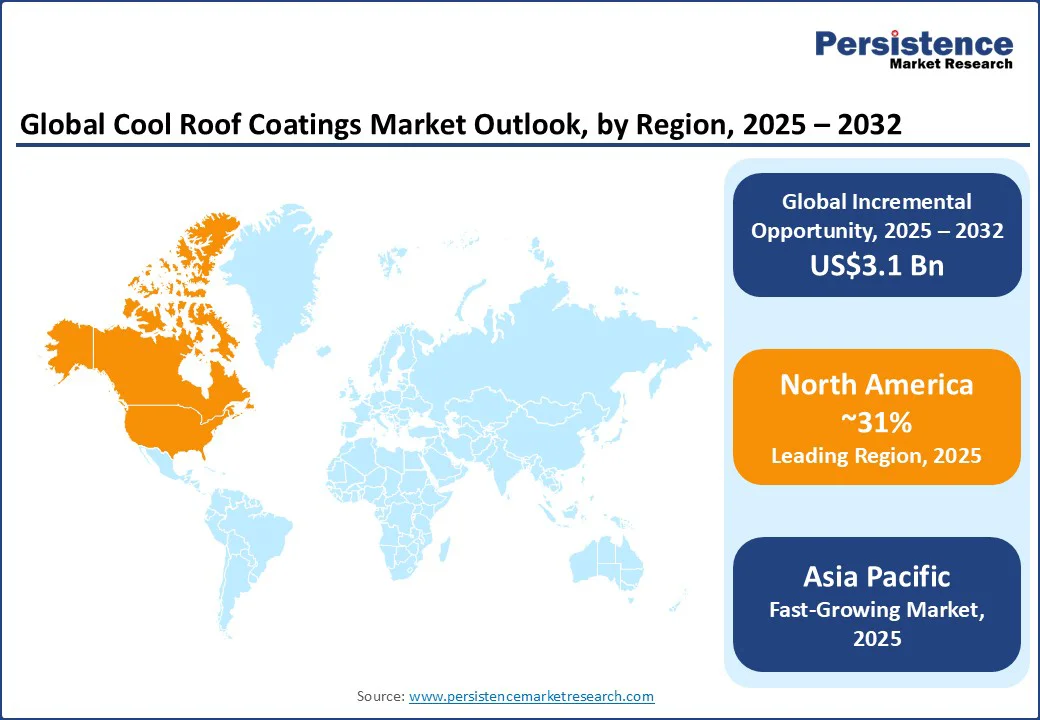ID: PMRREP35287| 190 Pages | 28 Aug 2025 | Format: PDF, Excel, PPT* | Chemicals and Materials

The global cool roof coatings market size is projected to rise from US$5 Bn in 2025 to US$8.1 Bn by 2032. It is anticipated to witness a CAGR of 7.2% during the forecast period from 2025 to 2032. Cool roof coatings, also known as reflective roof coatings, are designed to reflect solar radiation, minimize heat absorption, and maintain lower building temperatures, thereby reducing cooling energy consumption.
With electricity costs climbing, urban heat island effects intensifying, and continuous advancements in high-performance coating technologies, the adoption of cool roof coatings is expected to accelerate significantly over the coming years.
Key Industry Highlights

The cool roof coatings market is witnessing strong growth due to the rising demand for energy-efficient building materials that reduce cooling costs and improve indoor comfort. Cool roof coatings reflect a significant portion of solar radiation and absorb less heat than conventional roofing, lowering roof surface temperatures by up to 30–40% and cutting cooling energy consumption by nearly 15–40%.
According to the U.S. Department of Energy and Lawrence Berkeley National Laboratory, buildings equipped with cool roofs can save between US$0.07-0.10 per square foot annually in cooling costs, while also reducing peak electricity demand by up to 20%. These savings are particularly critical in hot climates and densely populated urban areas, where air conditioning loads are high. As energy costs increase and building efficiency standards such as ENERGY STAR and LEED tighten, the global adoption of cool roof coatings is rapidly growing.
A key restraint for the cool roof coatings market is the higher upfront installation cost, which is notably higher than traditional roofing materials or methods. While cool roof coatings are proven to reduce cooling energy use by 15–40%, the initial expense, including reflective pigments, specialized formulations, and added surface preparation, poses a barrier to widespread adoption.
The U.S. Department of Energy estimates that cool roof installation can cost US$0.75-1.50 per square foot more than conventional roofs. For large commercial retrofits, this added cost can translate to US$200,000 or more for a 200,000-square-foot facility, often making subsidies or tax incentives necessary for the project to be financially feasible.
A study by Lawrence Berkeley National Laboratory found that the payback period for cool roofs can extend to 6–15 years, discouraging their adoption in price-sensitive markets, where shorter ROI is prioritized. Consequently, high upfront costs remain a significant limitation to broader market penetration.
The growing emphasis on sustainability and green building standards worldwide is creating substantial potential for the adoption of cool roof coatings, as more industries prioritize energy efficiency and carbon reduction in construction. Governments and industries are increasingly prioritizing energy efficiency and carbon reduction, which aligns directly with the advantages offered by reflective roof coatings.
The U.S. Department of Energy has set a goal to reduce building energy consumption by 20% by 2030, creating strong potential for cool roofing solutions. Green building certifications are also encouraging adoption, with studies showing that LEED-certified buildings use 25 to 30 percent less energy, while BREEAM-certified structures consume 28 percent less energy and generate 30 percent fewer carbon emissions than conventional buildings.
Research by Global Cool Cities Alliance further suggests that large-scale adoption of cool roofs could offset up to 24 gigatons of carbon dioxide globally, making them a vital contributor to net-zero emission targets and climate resilience strategies. As urban heat islands intensify and construction activity grows across residential, commercial, and industrial sectors, cool roof coatings are increasingly being recognized as a key solution in the sustainable construction industry.
Acrylic cool roof coatings are anticipated to dominate with approximately 36.1% of the market share in 2025, due to their affordability, durability, and high solar reflectance. These coatings are especially effective for low-slope residential and commercial roofs, where they provide excellent UV protection and extend roof life while maintaining superior reflective performance. Their strong resistance to weathering, including rain, wind, and temperature fluctuations, makes them suitable for diverse climatic conditions.
In addition, acrylic coatings are water-based with low VOC emissions, making them an environmentally friendly choice that aligns with global sustainability and green building standards such as LEED and ENERGY STAR. A notable innovation in this segment is LuminX® Solar Heat Reflective Cool Roof Coating, featuring a PU + acrylic nanotechnology formulation that enhances solar reflectivity and thermal emittance, reducing roof temperatures by up to 40% and lowering indoor temperatures by nearly 20%, directly contributing to energy savings and occupant comfort.
Water-based cool roof coatings are expected to account for about 40% market share in 2025, gaining momentum as one of the fastest-growing technologies in the global market due to their eco-friendly properties, low VOC emissions, and compliance with stringent environmental regulations. These coatings combine strong solar reflectivity with ease of application and quick drying time, making them highly suitable for both residential and commercial projects. Their ability to reduce roof surface temperatures translates into lower energy consumption, reduced HVAC load, and improved building energy efficiency.
As the construction industry increasingly emphasizes sustainable roofing materials and energy-efficient building practices, water-based cool roof coatings stand out as a cost-effective and practical solution. A recent innovation in this space is EXCEL CoolCoat®, a hybrid water-based roof coating with reflective and nano-insulating pigments that reduce roof surface temperatures by up to 20°C during peak summer, lowering indoor heat levels and helping building owners lower electricity bills while supporting global climate resilience goals.

North America is anticipated to dominate the market with approximately 31% of the share, supported by strict energy efficiency regulations, government incentives, and rising awareness of the urban heat island effect. The U.S. leads regional adoption, with California’s Title 24 Building Energy Efficiency Standards requiring reflective roofing solutions in both new construction and major renovations.
Widespread adoption of LEED-certified buildings is further accelerating demand, as cool roof coatings help meet sustainability benchmarks and reduce cooling energy use. With strong commitments to carbon reduction and energy-efficient building materials, North America remains the largest market for cool roof coatings.
Europe is expected to witness steady growth in the market, driven by the European Union’s Energy Efficiency Directive (EED) and increasing demand for green building certifications. Southern European nations such as Spain and Italy are leading the way in adoption, due to their hotter summer climates, where reflective coatings significantly help reduce indoor cooling demands.
In densely populated cities, including Rome and Madrid, studies have shown that the adoption of cool roofs is linked to a decrease in heat-related illnesses during intense heat waves. Northern Europe has been slower to adopt cool roofing since reflective benefits are limited in colder winters, but EU climate commitments and stricter carbon neutrality goals are expanding opportunities across the region.
Asia Pacific is likely to be the fastest-growing region in the market, fueled by rapid urbanization, high cooling energy demand, and government-backed initiatives promoting sustainable construction. India’s Cool Roof Initiative and the Telangana Cool Roof Policy (2023) are landmark programs aiming to deploy cool roof technologies at scale. The Telangana government targets covering 300 km² of rooftops with cool roofing by 2028, including 200 km² in Hyderabad alone.
Studies suggest that widespread implementation of cool roofs in Asia's informal settlements could prevent more than 317,000 deaths and reduce CO? emissions by 68 million tons by 2030. With tropical and subtropical climates dominating the region, cool roof coatings are emerging as a cost-effective, energy-saving solution for both residential and commercial construction, positioning Asia Pacific as the most promising market for future growth.

The global cool roof coatings market is highly competitive, with major players such as PPG Industries, Sherwin-Williams, GAF Materials, AkzoNobel, and Dow leading the landscape. These companies are investing in advanced product formulations that enhance solar reflectivity, improve thermal performance, and reduce energy consumption in buildings. The market is also witnessing the entry of regional manufacturers and innovative startups focusing on eco-friendly and nanotechnology-based solutions to capture niche segments.
Rising energy costs, stricter building codes, and the growing emphasis on sustainable construction are intensifying competition, pushing companies to differentiate through innovation and green certifications. Strategic partnerships, mergers, and regional expansions are further shaping the competitive dynamics, while government incentives and green building programs are accelerating adoption. With strong R&D investments and expanding portfolios, leading companies are positioning cool roof coatings as a cost-effective and climate-resilient solution for residential, commercial, and industrial applications.
The cool roof coatings market is projected to be valued at US$5 Bn in 2025.
The cool roof coatings market is driven by cool roof coatings reduce heat build-up within buildings, lowering the need for air conditioning and saving energy.
The cool roof coatings market is poised to witness a CAGR of 7.2% between 2025 and 2032
Growing focus on sustainability and green building standards is the key market opportunity.
Major players in the cool roof coatings market include NuTech Paint, Valspar, NIPPON PAINT (M) SDN. BHD., Sika AG, and Excel Coatings.
|
Report Attribute |
Details |
|
Cool Roof Coatings Market Size (2025E) |
US$5 Bn |
|
Market Value Forecast (2032F) |
US$8.1 Bn |
|
Projected Growth (CAGR 2025 to 2032) |
7.2% |
|
Historical Market Growth (CAGR 2019 to 2024) |
6.8% |
|
Historical Data/Actuals |
2019 - 2024 |
|
Forecast Period |
2025 - 2032 |
|
Market Analysis |
Value: US$ Bn |
|
Geographical Coverage |
|
|
Segmental Coverage |
|
|
Competitive Analysis |
|
|
Report Highlights |
|
|
Customization and Pricing |
Available upon request |
By Product Type
By Roof Type
By Technology
By End-Use Industry
By Region
Delivery Timelines
For more information on this report and its delivery timelines please get in touch with our sales team.
About Author